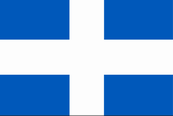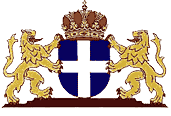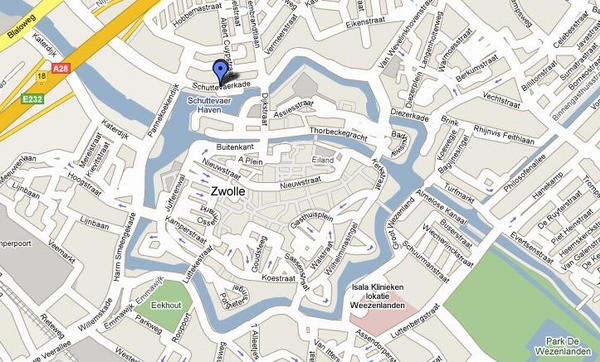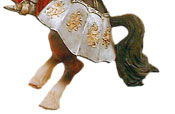| Dockings and Events |
|
| Museum ship Castle Vlotburg in Zwolle starts on 01.12. till 31.12.2024 |
 |
Location: Schuttevaerkade
History
Zwolle originated in the Middle Ages on a cover sand ridge between the IJssel and the Overijsselse Vecht on the small river Aa. This was a higher and habitable spot in the otherwise marshy landscape. Such a place was then called a "suolle," which later became corrupted to Zwolle.
This cover sand ridge is still visible through the height differences in the city. For example, the Sassenstraat is higher than the Grote Kerkplein. The difference in height is most obvious in the passage between the Voorstraat and the Melkmarkt. Here steps have been built to accommodate the difference in height.
The oldest traces of habitation date from the Young Stone Age. Itinerant tribes then inhabited the sand ridges. In some sources, these tribes are also referred to as the Isala people, after the Latin name of the river IJssel.
In 1993, during the construction of Ittersumerbroek, a district of Zwolle-Zuid, traces of two pole circles from the Bronze Age were found. These are also referred to as the Woodhenge of Zwolle.
City seal from 1295 with image of Saint Michael killing a basilisk.The oldest written mention, from 1040, speaks of a parish church consecrated to Saint Michaelël. In 1230 Zwolle received city rights from its landlord the Utrecht bishop Wilbrand of Oldenburg in gratitude for help in building a fortress in Hardenberg. This was in response to the Battle of Ane.
In 1438 Zwolle obtained stack rights from bishop Rudolf of Diepholt,[2] and in 1448 the emperor of the Holy Roman Empire confirmed the city rights of Zwolle by including the city among the cities of the German Empire. Zwolle joined the Hanseatic League as a trading city and in the fifteenth century, the city's heyday, was the center of the Modern Devotion, a religious movement that, on the initiative of Geert Grote, expanded across much of Europe, initially from Deventer, but later from Zwolle.
In August 1572, Zwolle was conquered by Willem van den Bergh, a brother-in-law of William of Orange. But after the massacre of Zutphen on Nov. 16 by Don Frederik's Spanish troops, the city voluntarily surrendered with several other towns to avoid bloodshed.
 
The States of Overijssel initially did not participate in the Union of Utrecht, which was intended as a military alliance against the advancing Spanish troops. But when the stadholder of Friesland, Groningen, Drenthe and Overijssel - George of Lalaing - defected to Spain on March 3, 1580, the people of Zwolle made it clear that they did not want to leave the rebellion and no longer recognized the stadholder. One Lubert Ulger unleashed a revolt in Zwolle, and on June 15 he and a group of Calvinist insurgents managed to defeat the Catholics and Spanish soldiers in a street fight in Diezerstraat. After a mediation by William of Orange, van Lalaing got only Groningen to join the Spanish side, and Overijssel and Drenthe joined the Union of Utrecht.
During Parma's Nine Years, Zwolle was the only city not recaptured by the Spaniards. During Maurice of Orange's Ten Years, the city was a military base from which Overijssel and Gelderland could be recaptured.
In the Republic of the United Netherlands, Overijssel had no real capital; the states consisted of delegates from Deventer, Kampen, Zwolle and the Overijssel Knighthood. Meetings took place alternately in one of the three cities.
French times and the 19th century
It was not until the French period that Zwolle received the status of capital, first of the Department of the Old IJssel, then of the Department of Overijssel and, after the annexation by the First French Empire, of the Department Mouths of the IJssel or Bouches-de-l'Yssel. After the departure of the French, Zwolle became the capital of the province of Overijssel.
In 1837 the last death sentence in Zwolle was carried out on the Grote Markt. Albert Wetterman, a native of Wijhe, was sentenced to this penalty because of the murder of his wife Gerritdina Lankhorst.
source: www.wikipedia.nl

source: www.google.nl/maps |
|
 |
|
| |
|
|
|

